Unit 1 Great Scientists warming up&reading
文档属性
| 名称 | Unit 1 Great Scientists warming up&reading | 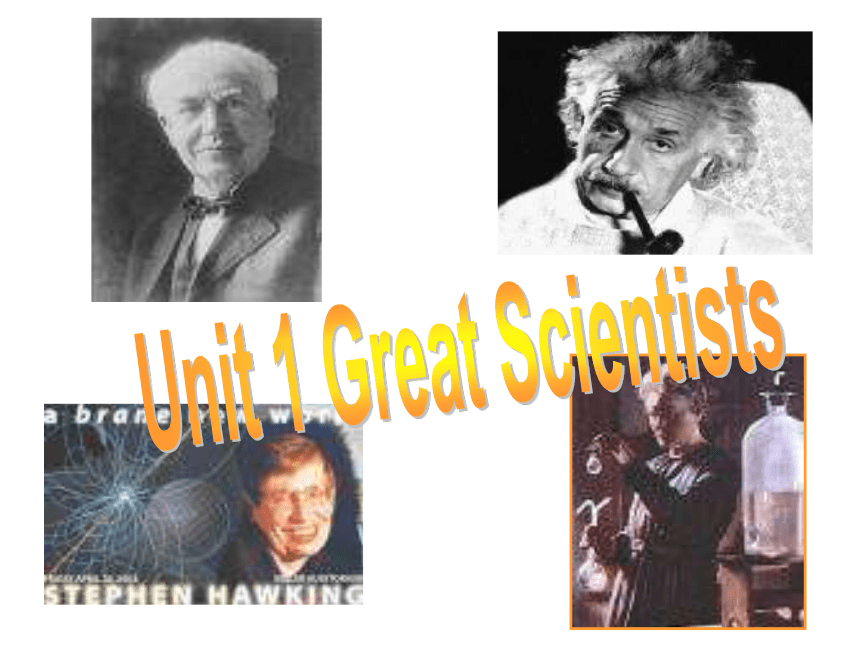 | |
| 格式 | rar | ||
| 文件大小 | 1.2MB | ||
| 资源类型 | 教案 | ||
| 版本资源 | 人教版(新课程标准) | ||
| 科目 | 英语 | ||
| 更新时间 | 2008-10-01 20:26:00 | ||
图片预览

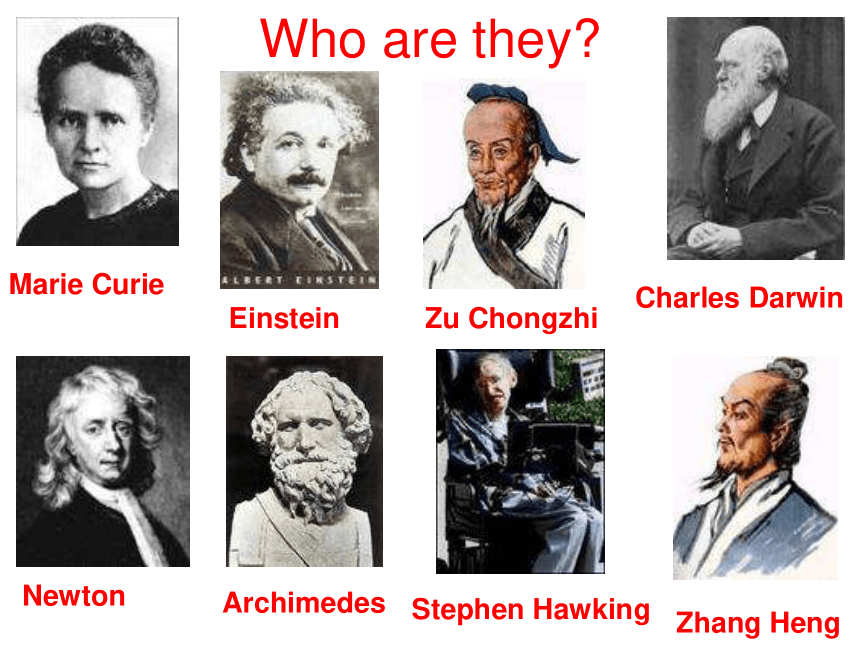
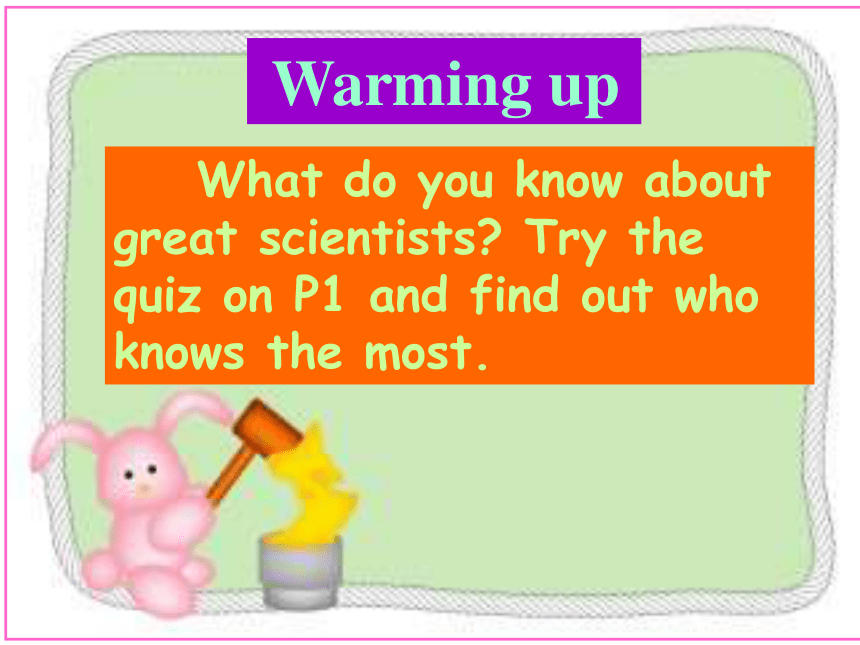
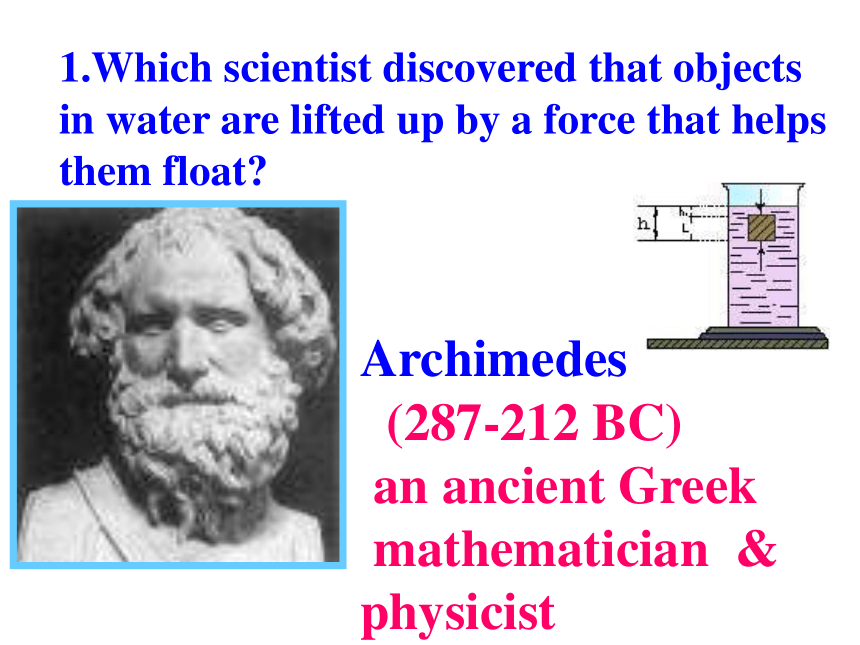
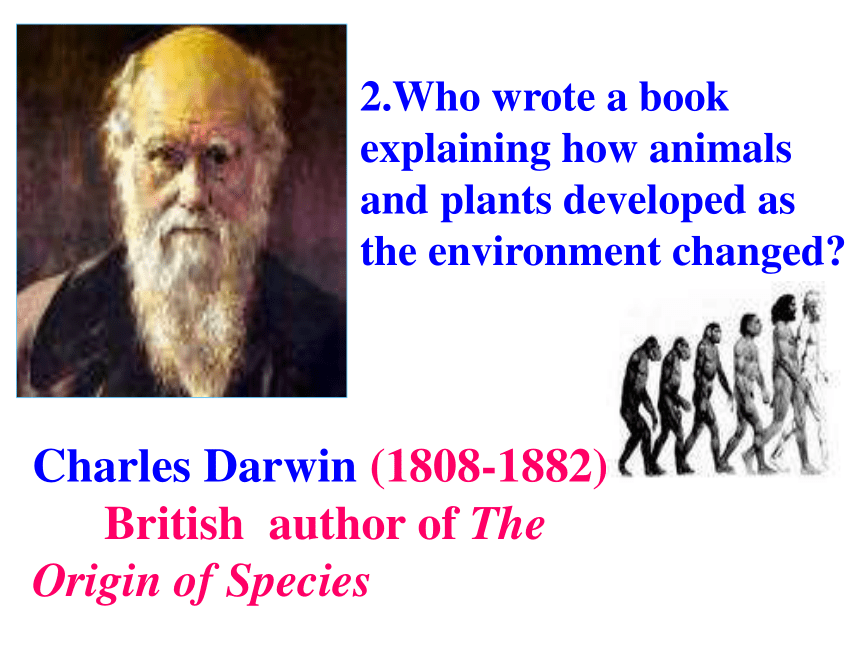
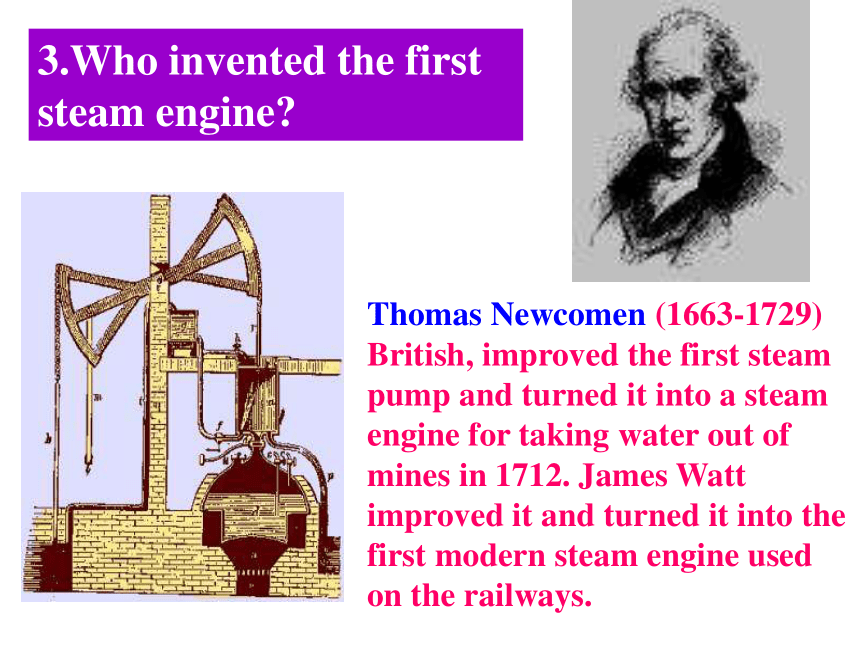
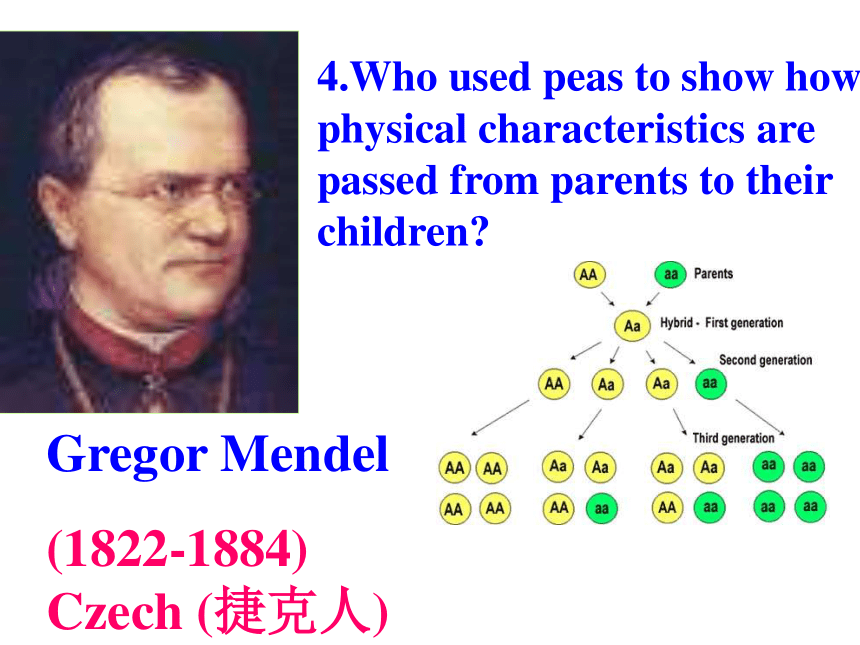
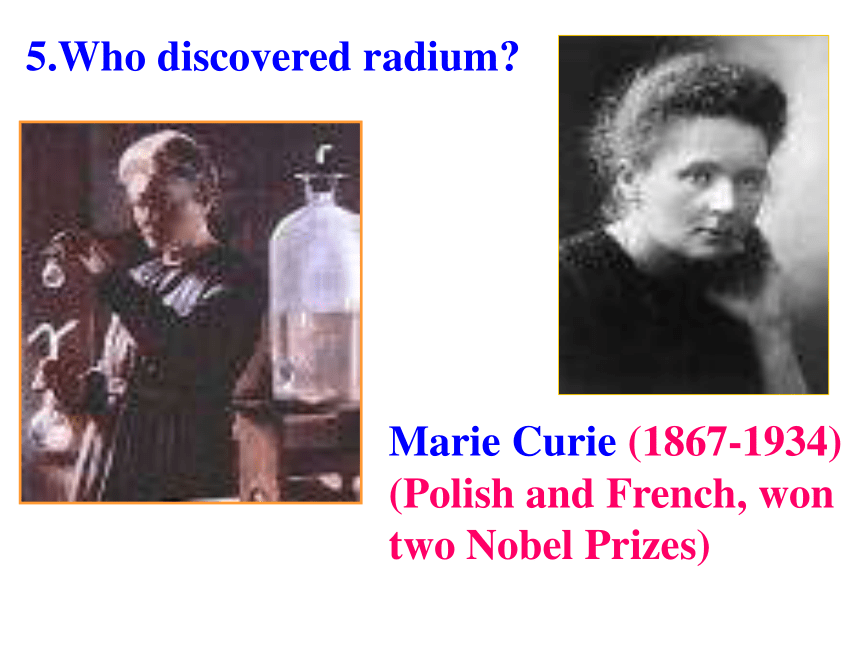
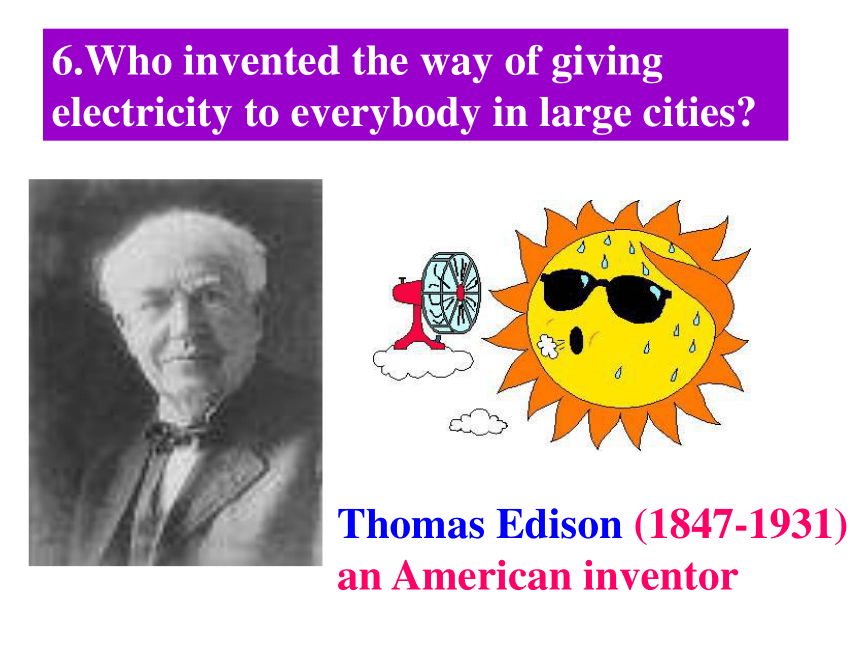
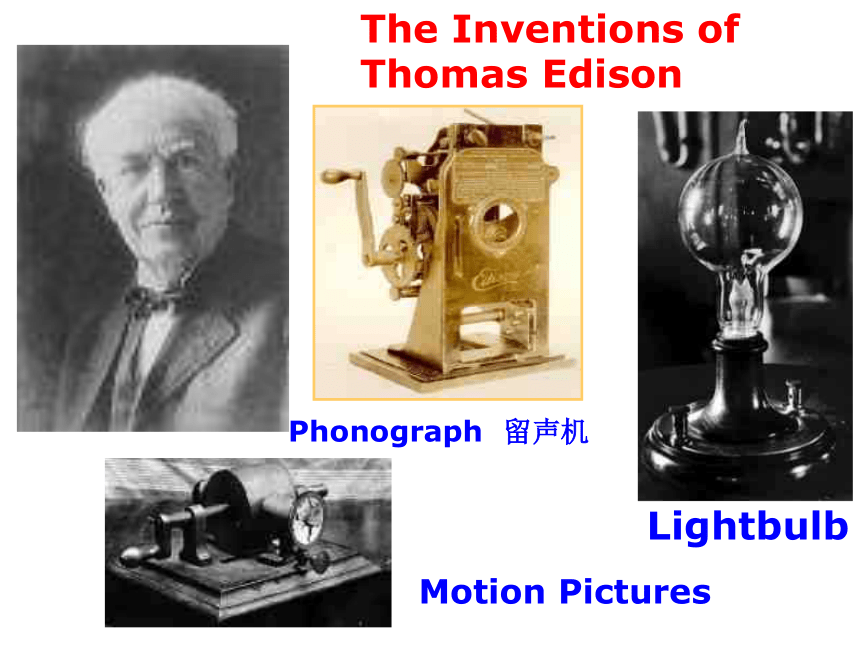
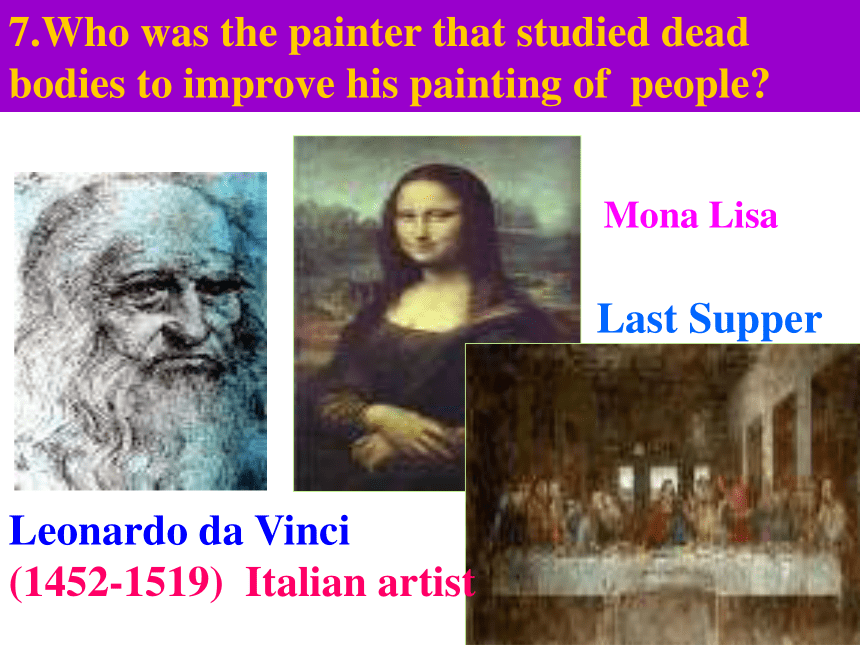
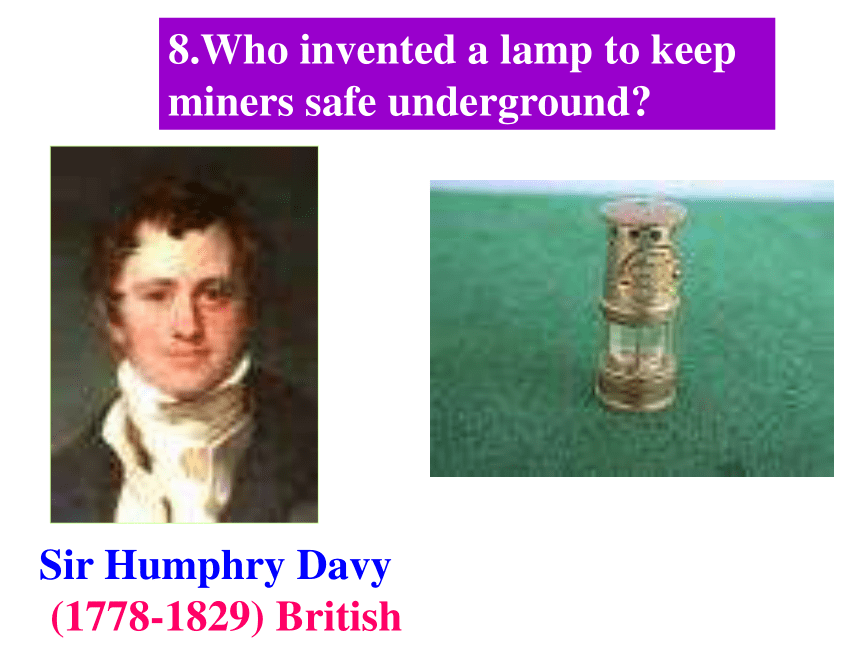
文档简介
课件37张PPT。
Unit 1 Great ScientistsWho are they?Marie Curie Einstein Zu Chongzhi Charles Darwin Newton Archimedes Stephen Hawking Zhang Heng What do you know about great scientists? Try the quiz on P1 and find out who knows the most. Warming up1.Which scientist discovered that objects in water are lifted up by a force that helps them float?Archimedes
(287-212 BC)
an ancient Greek
mathematician & physicist2.Who wrote a book explaining how animals and plants developed as the environment changed?Charles Darwin (1808-1882)
British author of The Origin of Species 3.Who invented the first steam engine?Thomas Newcomen (1663-1729) British, improved the first steam pump and turned it into a steam engine for taking water out of mines in 1712. James Watt improved it and turned it into the first modern steam engine used on the railways. 4.Who used peas to show how physical characteristics are passed from parents to their children?Gregor Mendel
(1822-1884) Czech (捷克人)5.Who discovered radium?Marie Curie (1867-1934) (Polish and French, won two Nobel Prizes)6.Who invented the way of giving electricity to everybody in large cities?Thomas Edison (1847-1931) an American inventorThomas EdisonThe Inventions of Thomas Edison Phonograph 留声机LightbulbMotion Pictures7.Who was the painter that studied dead bodies to improve his painting of people? Last SupperMona LisaLeonardo da Vinci
(1452-1519) Italian artist8.Who invented a lamp to keep miners safe underground?Sir Humphry Davy
(1778-1829) BritishMiniature Miner's Safety Lamp 9.Who invented the earliest instrument to tell people where earthquakes happened?Zhang Heng
(78-139) Chinese, invented seismograph10.Who put forward a theory about black holes?Stephen Hawking
(1942--) a British astronomerPre-readingDiscuss and answer the following questions.
1. Do you know how to prove a new idea in scientific research?
Discuss in small groups the stages in examining a new scientific idea. What order would you put them in?
Draw a conclusion Find a problem
Think of a method Analyse the results
Collect results Find supporting evidence
Make a question 12345672. What do you know about infectious diseases? What do you know about cholera?It is a kind of terrible disease caused by drinking dirty water and it caused a lot of deaths in the old times and it was very difficult to defeat.Let’s get to know how Dr. John Snow defeated “King Cholera” in 1854 in London in this reading passage:
John Snow Defeats “King Cholera”Who defeats “King Cholera“?
What happened in 1854?
How many people died in 10 days?
Why is there no death at No. 20 and 21 Broad Street as well as at No. 8 and 9 Cambridge Street?
John SnowCholera outbreak hit London.500These families had not drunk the water from the Broad Street pump.Task 1:Skim and ScanDo you know what this map was used for in 1854?Finding out the cause of Cholera.Task 2: Ex1 on page 3__ John Snow began to test two theories.
__ An outbreak of cholera hit London in 1854.
__ John Snow marked the deaths on a map.
__ He announced that the water carried the disease.
__ John Snow investigated two streets where the outbreak was very severe.
__King Cholera was defeated.
__ he found that most of the deaths were near a water pump.
__ He had the handle removed from the water pump.21473856Task 3: Discuss and answer1. Why couldn’t the cholera be under control at first?
2. Cholera was a 19th century disease. What disease do you think is similar to cholera today? Why?
3. Which theory did John Snow believe in? How did he finally prove it?1 Why couldn’t the cholera be under control at first?
2. Cholera was a 19th century disease. What disease do you think is similar to cholera today? Why?
Neither its cause, not its cure was understood.Three disease, which are similar today, are SARS, AIDS and bird flu, because they are serious, have an unknown cause and need public health care to solve them.3. Which theory did John Snow believe in? How did he finally prove it?
A. gathering information with the help of a map
B. looking into the source of the water for Broad Street and Cambridge Street
C. separating those who suffered cholera from those who didn’t
D. both A and BPeople absorbed cholera into their bodies with their meals.Write a short summary of the passage by filling in the blanks:
John Snow was a well-known ____ in London in the ___ century. He wanted to find the ______ of cholera in order to ______ it. In 1854 when a cholera ____ London, he began to gather information. He _____ on a map where all the dead people had lived and he found that many people who had drunk the dirty water from the ______ died. So he decided that the polluted water carried cholera. He suggested that the _____ of all water supply be _______ and the water companies were _________ not to _____ people to ______ water any more. Finally, “King Cholera” was defeated.doctor19thcausedefeathitmarkedpumpsourceexaminedinstructedexposepollutedLanguage
pointsUseful words and phrases:提出理论
了解
照顾
感到振奋
暴露;受到风险
解决问题
对……感兴趣
一股危险的气体
吸入
收集信息
put forward a theoryknow aboutattend (to)become inspired expose… to…solve the problembecome interested ina cloud of dangerous gasabsorb … intogather information11. 决心
12. 深入调查
13. 该受责备
14. 调查水源
15. 拆掉水泵的把手
16. 缓解;放慢速度
17. 与……有关联
18. 死于霍乱
19. 肯定地宣布
20. 防止be determined tomake further investigationbe to blamelook into the source of the waterremove the handle from the pumpslow downbe linked todie of choleraannounce with certaintyprevent… from…Sentence
StructuresSo many thousands of terrified people died every time there was an outbreak.
每次爆发霍乱时,就有大批惊恐的老百姓病死。
每次见到他,我总会想起我们之间发生的事。
*Every time I meet him, I always think of the things happened between us.
表示时间的名词短语、连词、副词都可以连接时间状语从句。
我一看到他,就会把信给他。
*I will give the letter to him as soon as / the moment / immediately / directly / instantly I see him.
2. The first suggested that cholera multiplied in the air.
The second suggested that people absorbed this disease into their bodies with their meals.
To prevent this from happening again, John Snow suggested that the source of all the water supplies (should) be examined.
suggest: 暗示,间接表明;建议
建议某人做某事:suggest to sb. sth.
suggest sb. doing sth.
suggest (that) sb. (should) do sth. *She suggested that her father
(should)give up smoking.
她建议她父亲戒烟。
*The smile on her face suggested
that she agreed with me.
她脸上的微笑表明她同意了我。
他建议我们参观长城。
He suggested to us a visit to the Great Wall.
He suggested us visiting the Great Wall.
He suggested that we (should) visit the Great Wall.
Translation:
他建议我买一台电脑。(造两个句子)
我一看到她就马上认出了她。(the moment)
他该为这次事故负责任。(blame for)
2. Do the Exx1-3 on page 4.Homework Ex1 on page4victim
physician
analyse
defeat
challenge
enquiry
pump
blame
absorb
link…toEx2 on page 4severe
suspected
exposed
experts
cure
foresaw
concluded
announced
attendedEx3 on page4make a suggestion = to suggest
make a plan = to plan
make a speech = to speak
make a change = to change
make an investigation = to investigate
make a decision = to decide
make a contribution = to contribute
make a noise = to by noisy
make a description = to describe
Unit 1 Great ScientistsWho are they?Marie Curie Einstein Zu Chongzhi Charles Darwin Newton Archimedes Stephen Hawking Zhang Heng What do you know about great scientists? Try the quiz on P1 and find out who knows the most. Warming up1.Which scientist discovered that objects in water are lifted up by a force that helps them float?Archimedes
(287-212 BC)
an ancient Greek
mathematician & physicist2.Who wrote a book explaining how animals and plants developed as the environment changed?Charles Darwin (1808-1882)
British author of The Origin of Species 3.Who invented the first steam engine?Thomas Newcomen (1663-1729) British, improved the first steam pump and turned it into a steam engine for taking water out of mines in 1712. James Watt improved it and turned it into the first modern steam engine used on the railways. 4.Who used peas to show how physical characteristics are passed from parents to their children?Gregor Mendel
(1822-1884) Czech (捷克人)5.Who discovered radium?Marie Curie (1867-1934) (Polish and French, won two Nobel Prizes)6.Who invented the way of giving electricity to everybody in large cities?Thomas Edison (1847-1931) an American inventorThomas EdisonThe Inventions of Thomas Edison Phonograph 留声机LightbulbMotion Pictures7.Who was the painter that studied dead bodies to improve his painting of people? Last SupperMona LisaLeonardo da Vinci
(1452-1519) Italian artist8.Who invented a lamp to keep miners safe underground?Sir Humphry Davy
(1778-1829) BritishMiniature Miner's Safety Lamp 9.Who invented the earliest instrument to tell people where earthquakes happened?Zhang Heng
(78-139) Chinese, invented seismograph10.Who put forward a theory about black holes?Stephen Hawking
(1942--) a British astronomerPre-readingDiscuss and answer the following questions.
1. Do you know how to prove a new idea in scientific research?
Discuss in small groups the stages in examining a new scientific idea. What order would you put them in?
Draw a conclusion Find a problem
Think of a method Analyse the results
Collect results Find supporting evidence
Make a question 12345672. What do you know about infectious diseases? What do you know about cholera?It is a kind of terrible disease caused by drinking dirty water and it caused a lot of deaths in the old times and it was very difficult to defeat.Let’s get to know how Dr. John Snow defeated “King Cholera” in 1854 in London in this reading passage:
John Snow Defeats “King Cholera”Who defeats “King Cholera“?
What happened in 1854?
How many people died in 10 days?
Why is there no death at No. 20 and 21 Broad Street as well as at No. 8 and 9 Cambridge Street?
John SnowCholera outbreak hit London.500These families had not drunk the water from the Broad Street pump.Task 1:Skim and ScanDo you know what this map was used for in 1854?Finding out the cause of Cholera.Task 2: Ex1 on page 3__ John Snow began to test two theories.
__ An outbreak of cholera hit London in 1854.
__ John Snow marked the deaths on a map.
__ He announced that the water carried the disease.
__ John Snow investigated two streets where the outbreak was very severe.
__King Cholera was defeated.
__ he found that most of the deaths were near a water pump.
__ He had the handle removed from the water pump.21473856Task 3: Discuss and answer1. Why couldn’t the cholera be under control at first?
2. Cholera was a 19th century disease. What disease do you think is similar to cholera today? Why?
3. Which theory did John Snow believe in? How did he finally prove it?1 Why couldn’t the cholera be under control at first?
2. Cholera was a 19th century disease. What disease do you think is similar to cholera today? Why?
Neither its cause, not its cure was understood.Three disease, which are similar today, are SARS, AIDS and bird flu, because they are serious, have an unknown cause and need public health care to solve them.3. Which theory did John Snow believe in? How did he finally prove it?
A. gathering information with the help of a map
B. looking into the source of the water for Broad Street and Cambridge Street
C. separating those who suffered cholera from those who didn’t
D. both A and BPeople absorbed cholera into their bodies with their meals.Write a short summary of the passage by filling in the blanks:
John Snow was a well-known ____ in London in the ___ century. He wanted to find the ______ of cholera in order to ______ it. In 1854 when a cholera ____ London, he began to gather information. He _____ on a map where all the dead people had lived and he found that many people who had drunk the dirty water from the ______ died. So he decided that the polluted water carried cholera. He suggested that the _____ of all water supply be _______ and the water companies were _________ not to _____ people to ______ water any more. Finally, “King Cholera” was defeated.doctor19thcausedefeathitmarkedpumpsourceexaminedinstructedexposepollutedLanguage
pointsUseful words and phrases:提出理论
了解
照顾
感到振奋
暴露;受到风险
解决问题
对……感兴趣
一股危险的气体
吸入
收集信息
put forward a theoryknow aboutattend (to)become inspired expose… to…solve the problembecome interested ina cloud of dangerous gasabsorb … intogather information11. 决心
12. 深入调查
13. 该受责备
14. 调查水源
15. 拆掉水泵的把手
16. 缓解;放慢速度
17. 与……有关联
18. 死于霍乱
19. 肯定地宣布
20. 防止be determined tomake further investigationbe to blamelook into the source of the waterremove the handle from the pumpslow downbe linked todie of choleraannounce with certaintyprevent… from…Sentence
StructuresSo many thousands of terrified people died every time there was an outbreak.
每次爆发霍乱时,就有大批惊恐的老百姓病死。
每次见到他,我总会想起我们之间发生的事。
*Every time I meet him, I always think of the things happened between us.
表示时间的名词短语、连词、副词都可以连接时间状语从句。
我一看到他,就会把信给他。
*I will give the letter to him as soon as / the moment / immediately / directly / instantly I see him.
2. The first suggested that cholera multiplied in the air.
The second suggested that people absorbed this disease into their bodies with their meals.
To prevent this from happening again, John Snow suggested that the source of all the water supplies (should) be examined.
suggest: 暗示,间接表明;建议
建议某人做某事:suggest to sb. sth.
suggest sb. doing sth.
suggest (that) sb. (should) do sth. *She suggested that her father
(should)give up smoking.
她建议她父亲戒烟。
*The smile on her face suggested
that she agreed with me.
她脸上的微笑表明她同意了我。
他建议我们参观长城。
He suggested to us a visit to the Great Wall.
He suggested us visiting the Great Wall.
He suggested that we (should) visit the Great Wall.
Translation:
他建议我买一台电脑。(造两个句子)
我一看到她就马上认出了她。(the moment)
他该为这次事故负责任。(blame for)
2. Do the Exx1-3 on page 4.Homework Ex1 on page4victim
physician
analyse
defeat
challenge
enquiry
pump
blame
absorb
link…toEx2 on page 4severe
suspected
exposed
experts
cure
foresaw
concluded
announced
attendedEx3 on page4make a suggestion = to suggest
make a plan = to plan
make a speech = to speak
make a change = to change
make an investigation = to investigate
make a decision = to decide
make a contribution = to contribute
make a noise = to by noisy
make a description = to describe
